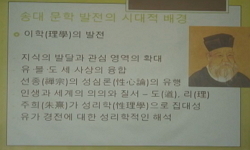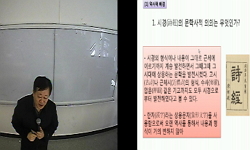The aim of this paper is to compare five different editions of Chinese Literary History with in terms of their treatment of Zuo Zhuan( 左傳 ). This paper adopts as its method of comparison that of description in the original texts, one based on the ...
http://chineseinput.net/에서 pinyin(병음)방식으로 중국어를 변환할 수 있습니다.
변환된 중국어를 복사하여 사용하시면 됩니다.
- 中文 을 입력하시려면 zhongwen을 입력하시고 space를누르시면됩니다.
- 北京 을 입력하시려면 beijing을 입력하시고 space를 누르시면 됩니다.

중국문학사 서술 비교(1) - 『春秋左氏傳』 관련 서술을 중심으로 = A Comparative Analysis on Writing Chinese Literary History: Focusing on the Treatment of Zuo Zhuan(左傳)
한글로보기https://www.riss.kr/link?id=A106370311
-
저자
류준필 (서울대학교)
- 발행기관
- 학술지명
- 권호사항
-
발행연도
2019
-
작성언어
Korean
-
주제어
Chinese Literary History ; Zuo Zhuan左傳 ; jishi記事 ; jiyan記 ; technique of description ; treatment of warfare ; characterization ; 중국문학사 ; 춘추좌씨전 ; 기사(記事) ; 기언(記) ; 서술 기법 ; 전쟁 서술 ; 인물 형상화
-
등재정보
KCI등재
-
자료형태
학술저널
-
수록면
125-157(33쪽)
-
KCI 피인용횟수
0
- DOI식별코드
- 제공처
-
0
상세조회 -
0
다운로드
부가정보
다국어 초록 (Multilingual Abstract)
The aim of this paper is to compare five different editions of Chinese Literary History with in terms of their treatment of Zuo Zhuan( 左傳 ). This paper adopts as its method of comparison that of description in the original texts, one based on the distinction between 記 事(jishi, record of events and actions) and 記 (jiyan, record of words). To be specific, this paper examines the selected five editions proceeding first from classifying jishi into “technique of description”, “treatment of warfare” and “characterization”, then moving onto examining jiyan. The intent of this paper does not lie in finding out similarities and differences in terms of writing literary history; rather, it is in identifying standardized manner of writing literary history and thereby determining a set of passages from Zuo Zhuan suitable for fruitful comparative analysis. Ultimately, I hope such endeavor would contribute to a greater understanding of the way in which Chinese Literature is handled within and without Korea. I start with clarifying the way these editions characterize Zuo Zhuan in general and the passages they select as representative. I then reassess my initial findings from the point of contemporary perspectives and in consideration of regional and national elements. Lastly, even if there are no explanations written directly in the five writings of literary history, I tried to open the possibility of access from a new perspective by suggesting several stories on my perspective that require new emphasis or active interpretation from the current perspective. But, it did not point out the influence of Zuo Zhuan on later narrative literature, so it is difficult to deny the one-sidedness of the discussions presented in this paper. By focusing on the narrative of literary history published in recent years, the field of view was limited. These problems should be reinforced through further and wider work.
참고문헌 (Reference)
1 양승이, "呂祖謙의 『東萊博議』『鄭伯克段於鄢』을 통해 본 春秋學" 인문학연구원 (52) : 179-199, 2013
2 류준필, "한자문화권 문화교육에서의 古文 활용 방안과 그 의의" 중국어문학회 (26) : 271-304, 2008
3 당윤희, "한국 현대극의 <趙氏孤兒> 서사 변용과 ‘복수’의 해석" 중국어문연구회 (76) : 259-298, 2016
4 뤼샤오핑, "탁월한 각색 속에 드러나는 정의, 복수, 원죄 <조씨고아, 복수의 씨앗>" 한국연극평론가협회 80 : 56-61, 2016
5 백진우, "조선시대 지식인들의 『東萊博議』 수용의 의의" 한국한문학회 (54) : 173-214, 2014
6 오수경, "역사적 기억과 휴머니티로 다시 읽는 중국 고전 희곡, 〈조씨고아〉" 한국중국어문학회 93 : 215-234, 2017
7 월터 스콧, "아이반호" 현대지성사 1-686, 2004
8 웨인 부스, "소설의 수사학" 예림기획 206-228, 1999
9 H. 포터 애벗, "서사학강의" 문학과지성사 35-162, 2018
10 김성규, "사마천에서 볼테르까지: ‘趙氏孤兒’ 이야기의 進化 略史" 역사교육연구회 (141) : 159-195, 2017
1 양승이, "呂祖謙의 『東萊博議』『鄭伯克段於鄢』을 통해 본 春秋學" 인문학연구원 (52) : 179-199, 2013
2 류준필, "한자문화권 문화교육에서의 古文 활용 방안과 그 의의" 중국어문학회 (26) : 271-304, 2008
3 당윤희, "한국 현대극의 <趙氏孤兒> 서사 변용과 ‘복수’의 해석" 중국어문연구회 (76) : 259-298, 2016
4 뤼샤오핑, "탁월한 각색 속에 드러나는 정의, 복수, 원죄 <조씨고아, 복수의 씨앗>" 한국연극평론가협회 80 : 56-61, 2016
5 백진우, "조선시대 지식인들의 『東萊博議』 수용의 의의" 한국한문학회 (54) : 173-214, 2014
6 오수경, "역사적 기억과 휴머니티로 다시 읽는 중국 고전 희곡, 〈조씨고아〉" 한국중국어문학회 93 : 215-234, 2017
7 월터 스콧, "아이반호" 현대지성사 1-686, 2004
8 웨인 부스, "소설의 수사학" 예림기획 206-228, 1999
9 H. 포터 애벗, "서사학강의" 문학과지성사 35-162, 2018
10 김성규, "사마천에서 볼테르까지: ‘趙氏孤兒’ 이야기의 進化 略史" 역사교육연구회 (141) : 159-195, 2017
11 송태현, "볼테르의 『중국 고아』와 오리엔탈리즘" 세계문학비교학회 (44) : 189-210, 2013
12 조동일, "문학사는 어디로" 지식산업사 163-212, 2015
13 김미희, "동양적 사유와 연극성의 성공적 접목 <조씨고아, 복수의 씨앗>" 한국연극평론가협회 80 : 51-55, 2016
14 나카지마 아쓰시, "나카지마 아쓰시 작품집" 이숲에올빼미 21-53, 2013
15 오현수, "나쓰메 소세키와 춘추좌전" 일본언어문화학회 2 : 393-395, 2003
16 나쓰메 소세키, "나는 고양이로소이다" 문학사상사 325-327, 2008
17 정태현, "譯註 春秋左氏傳 1~8" 전통문화연구회 1-475, 2007
18 黃文吉, "臺灣出版 中國文學史書目提要(1949~1995)" 萬卷樓圖書有限公司 343-392, 1996
19 錢鐘書, "管錐編(1)" 中華書局 210-211, 1979
20 夏目漱石, "漱石全集 9권" 岩波書店 395-398, 1977
21 張高評, "左傳之文學價値" 文史哲出版社 150-157, 1982
22 李衛軍, "左傳 評點研究" 華東師範大學 2008
23 兪樟華, "史記與古代小說戲曲硏究" 黑龍江人民出版社 173-174, 2014
24 陳振鵬ㆍ章培恒, "古文鑑賞辭典(上)" 上海辭書出版社 13-17, 1997
25 김월회, "先秦시기 복수의 인문화 양상" 한국중국어문학회 83 : 107-138, 2015
26 張炯, "中國文學通史 卷1" 江蘇文藝出版社 1-118, 2013
27 韓兆琦, "中國文學史 卷1" 北京師範大學出版社 1-83, 1996
28 章培恒, "中國文學史 卷上" 復旦大學出版社 1-89, 2007
29 袁行霈, "中國文學史 卷1" 高等敎育出版社 1-107, 2002
30 郭預衡, "中國散文史 卷上" 上海古籍出版社 1-113, 2000
31 孫綠怡, "≪左傳≫與中國古典小說" 北京大學出版社 33-, 1992
32 王崇任, "≪左傳≫文學專題研究" 陝西師範大學 2012
33 李華, "≪左傳≫修辭硏究" 上海古籍出版社 152-157, 2010
동일학술지(권/호) 다른 논문
-
Тема природы в цикле «Тёмные аллеи» и лексическое представле ние
- 동북아시아문화학회
- 이기주
- 2019
- KCI등재
-
- 동북아시아문화학회
- 우재호
- 2019
- KCI등재
-
- 동북아시아문화학회
- 이재혁
- 2019
- KCI등재
-
- 동북아시아문화학회
- 송경애
- 2019
- KCI등재
분석정보
인용정보 인용지수 설명보기
학술지 이력
| 연월일 | 이력구분 | 이력상세 | 등재구분 |
|---|---|---|---|
| 2026 | 평가예정 | 재인증평가 신청대상 (재인증) | |
| 2020-01-01 | 평가 | 등재학술지 유지 (재인증) |  |
| 2017-01-01 | 평가 | 등재학술지 유지 (계속평가) |  |
| 2015-03-17 | 학회명변경 | 영문명 : 미등록 -> The Association of North-East Asian Cultures |  |
| 2013-01-01 | 평가 | 등재학술지 유지 (등재유지) |  |
| 2010-01-01 | 평가 | 등재학술지 유지 (등재유지) |  |
| 2007-01-01 | 평가 | 등재학술지 선정 (등재후보2차) |  |
| 2006-01-01 | 평가 | 등재후보학술지 유지 (계속평가) |  |
| 2004-07-01 | 평가 | 등재후보학술지 선정 (신규평가) |  |
학술지 인용정보
| 기준연도 | WOS-KCI 통합IF(2년) | KCIF(2년) | KCIF(3년) |
|---|---|---|---|
| 2016 | 0.46 | 0.46 | 0.43 |
| KCIF(4년) | KCIF(5년) | 중심성지수(3년) | 즉시성지수 |
| 0.41 | 0.37 | 0.629 | 0.09 |




 KCI
KCI DBpia
DBpia






